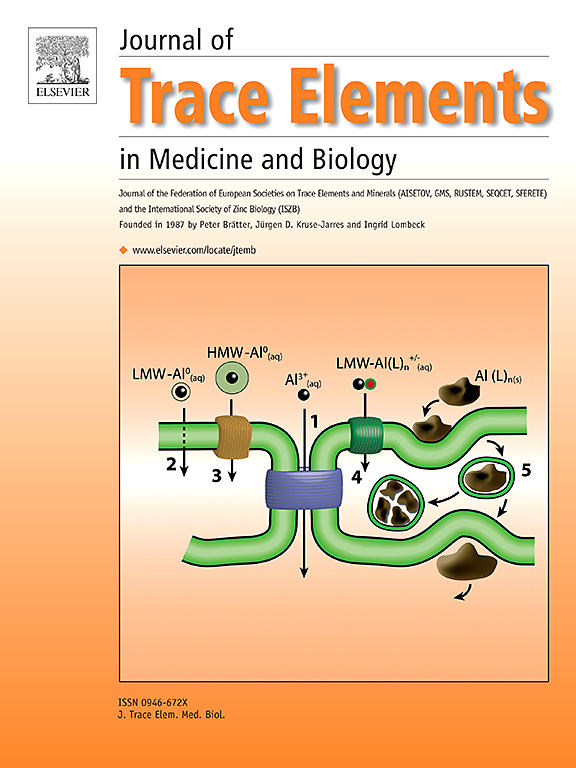锌辅助治疗SARS-CoV-2:一项随机临床试验
IF 3.6
3区 医学
Q2 BIOCHEMISTRY & MOLECULAR BIOLOGY
Journal of Trace Elements in Medicine and Biology
Pub Date : 2025-10-10
DOI:10.1016/j.jtemb.2025.127778
引用次数: 0
摘要
锌是一种微量元素,在免疫功能中起着关键作用,具有抗病毒和抗炎特性。低血浆锌水平与COVID-19的不良预后有关。本研究旨在评价补充锌作为COVID-19住院患者辅助治疗的有效性和安全性。方法于2021年5月至12月进行单中心、随机、开放标签临床试验。确诊COVID-19需要住院治疗的住院成人按1:1随机分组,接受标准治疗(SoC),有或没有口服醋酸锌(90 mg/天),持续14天。主要终点是疾病进展,定义为重症监护要求(ICU入院)或死亡。次要结局包括临床恢复时间、住院时间、WHO临床量表改善、炎症标志物、抗体反应和安全性。结果71例患者随机分为35例锌组和34例SoC组。锌组的疾病进展率为5.7% %,而SoC组为23.5% % (OR 0.21, 95 %CI = 0.03-0.96)。平均恢复时间明显短锌组(7.4 ±6.1和13.1 ± 9.7天,0.006 p = )和更快的复苏趋势观察Cox比例风险模型的干预组HR 1.670(95 %置信区间:0.948—-2.942),p = 0.076。锌组在第14天达到<; 1分的WHO评分改善更大(74.3 %对42.4 %,p = 0.009)。在第14和28天,SoC组的抗体水平较高。没有不良事件归因于锌。结论在标准护理中补充锌可减少COVID-19住院患者的疾病进展,并有加速临床康复的趋势,支持锌在治疗病毒性呼吸道感染中的潜在作用。临床试验注册号:clinicaltrials .gov, NCT05778383。本文章由计算机程序翻译,如有差异,请以英文原文为准。
Zinc adjuvant treatment in SARS-CoV-2: A randomized clinical trial
Introduction
Zinc is a trace element with a key role in immune function and has demonstrated antiviral and anti-inflammatory properties. Low plasma zinc levels have been associated with poor outcomes in COVID-19. This study aims to evaluate the efficacy and safety of zinc supplementation as an adjuvant therapy in hospitalized patients with COVID-19.
Methods
A single-center, randomized, open-label clinical trial between May and December 2021. Adults hospitalized with confirmed COVID-19 requiring hospitalization were randomized 1:1 to receive standard of care (SoC) with or without oral zinc acetate (90 mg/day) for 14 days. The primary endpoint was disease progression, defined as critical care requirement (ICU admission) or death. Secondary outcomes included time to clinical recovery, hospital length of stay, WHO clinical scale improvement, inflammatory markers, antibody response, and safety.
Results
Seventy-one patients were randomized (35 zinc versus 34 SoC). Disease progression occurred in 5.7 % of the zinc group versus 23.5 % in the SoC group (OR 0.21, 95 %CI = 0.03–0.96,). Mean recovery time was significantly shorter in the zinc group (7.4 ± 6.1 versus 13.1 ± 9.7 days, p = 0.006) and a trend to a faster recovery was observed in the Cox proportional hazards model in the intervention group HR of 1.670 (95 % CI: 0.948–2.942), p = 0.076. WHO scale improvement attaining a < 1 points at day 14 was greater in the zinc group (74.3 % versus 42.4 %, p = 0.009). Antibody levels were higher in the SoC group at days 14 and 28. No adverse events were attributed to zinc.
Conclusions
Adjunctive zinc supplementation to standard of care reduced disease progression and showed a trend to accelerated clinical recovery in hospitalized COVID-19 patients, supporting the potential role of zinc in managing viral respiratory infections.
Trial registration
ClinicalTrials.gov identifier, NCT05778383.
求助全文
通过发布文献求助,成功后即可免费获取论文全文。
去求助
来源期刊
CiteScore
6.60
自引率
2.90%
发文量
202
审稿时长
85 days
期刊介绍:
The journal provides the reader with a thorough description of theoretical and applied aspects of trace elements in medicine and biology and is devoted to the advancement of scientific knowledge about trace elements and trace element species. Trace elements play essential roles in the maintenance of physiological processes. During the last decades there has been a great deal of scientific investigation about the function and binding of trace elements. The Journal of Trace Elements in Medicine and Biology focuses on the description and dissemination of scientific results concerning the role of trace elements with respect to their mode of action in health and disease and nutritional importance. Progress in the knowledge of the biological role of trace elements depends, however, on advances in trace elements chemistry. Thus the Journal of Trace Elements in Medicine and Biology will include only those papers that base their results on proven analytical methods.
Also, we only publish those articles in which the quality assurance regarding the execution of experiments and achievement of results is guaranteed.

 求助内容:
求助内容: 应助结果提醒方式:
应助结果提醒方式:


